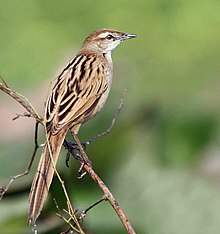
Back شاديات الأعشاب Arabic شاديات الاعشاب ARZ Kipsay (Locustellidae) AVK Sisəkquşları Azerbaijani Locustellidae Breton Locustèl·lids Catalan Locustellidae CEB Cvrčilkovití Czech Græssangere Danish Schwirlverwandte German
| Locustellidae | |
|---|---|

| |
| Striated grassbird (Megalurus palustris) | |
| Scientific classification | |
| Domain: | Eukaryota |
| Kingdom: | Animalia |
| Phylum: | Chordata |
| Class: | Aves |
| Order: | Passeriformes |
| Superfamily: | Sylvioidea |
| Family: | Locustellidae Bonaparte, 1854 |
| Genera | |
|
see text | |
| Synonyms | |
|
Megaluridae Blyth, 1875 | |
Locustellidae is a newly recognized family of small insectivorous songbirds ("warblers"), formerly placed in the Old World warbler "wastebin" family. It contains the grass warblers, grassbirds, and the Bradypterus "bush warblers". These birds occur mainly in Eurasia, Africa, and the Australian region. The family name is sometimes given as Megaluridae, but Locustellidae has priority.[1][2]
The species are smallish birds with tails that are usually long and pointed; the scientific name of the genus Megalurus in fact means "the large-tailed one" in plain English. They are less wren-like than the typical shrub-warblers (Cettia), but they are similarly drab brownish or buffy all over. They tend to be larger and slimmer than Cettia though, and many have bold dark streaks on wings and/or underside. Most live in scrubland and frequently hunt food by clambering through thick tangled growth or pursuing it on the ground; they are perhaps the most terrestrial of the "warblers". Very unusual for Passeriformes, the beginning of an evolution towards flightlessness is seen in some taxa.[3]
Among the "warbler and babbler" superfamily Sylvioidea, the Locustellidae are closest to the Malagasy warblers, another newly recognized (and hitherto unnamed) family. The black-capped donacobius (Donacobius atricapillus) is a South American relative derived from the same ancestral stock and not a wren as was long believed.[4]
A comprehensive molecular phylogenetic study of the grassbird family Locustellidae published in 2018 found that many of the genera, as then defined, were non-monophyletic. The resulting revision of the genus level taxonomy involved many changes including the resurrection of the genera Poodytes and Cincloramphus as well as the erection of a new genus Helopsaltes. The former genera Megalurulus and Buettikoferella become junior synonyms of Cincloramphus.[2][5]
- ^ Bock, Walter J. (1994). History and Nomenclature of Avian Family-Group Names. Bulletin of the American Museum of Natural History. Vol. Number 222. New York: American Museum of Natural History. p. 152. hdl:2246/830.
{{cite book}}:|volume=has extra text (help) - ^ a b Alström, P.; Cibois, A.; Irestedt, M.; Zuccon, D.; Gelang, M.; Fjeldså, J.; Andersen, M.J.; Moyle, R.G.; Pasquet, E.; Olsson, U. (2018). "Comprehensive molecular phylogeny of the grassbirds and allies (Locustellidae) reveals extensive non-monophyly of traditional genera, and a proposal for a new classification". Molecular Phylogenetics and Evolution. 127: 367–375. Bibcode:2018MolPE.127..367A. doi:10.1016/j.ympev.2018.03.029. PMID 29625229. S2CID 4645834.
- ^ del Hoyo, Josep; Elliott, Andrew & Sargatal, Jordi (eds.) (2006): Handbook of Birds of the World (Volume 11: Old World Flycatchers to Old World Warblers). Lynx Edicions, Barcelona. ISBN 84-96553-06-X
- ^ Alström, P.; Ericson, P.G.P.; Olsson, U.; Sundberg, P. (2006). "Phylogeny and classification of the avian superfamily Sylvioidea". Molecular Phylogenetics and Evolution. 38 (2): 381–397. Bibcode:2006MolPE..38..381A. doi:10.1016/j.ympev.2005.05.015. PMID 16054402.
- ^ Cite error: The named reference
iocwas invoked but never defined (see the help page).